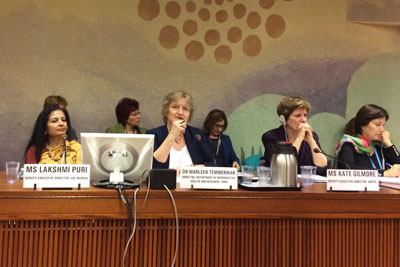Women’s health in the spotlight at the World Health Assembly
Date:

UN Women took an active role at the World Health Assembly (WHA), the main decision-making body of the World Health Organization (WHO), which hosted its 68th session in Geneva from 18 to 26 May 2015. It featured a 20-year assessment of the state of women’s health and women’s role in health, as well as the need for gender mainstreaming in this sector.
UN Women Deputy Executive Director Lakshmi Puri took a lead on a gender-focused panel on “Women and Health: Beijing Declaration +20” on 19 May. The discussion shed light on the unfinished development agenda—the remaining gap between women and men in health, and the unequal access to information, decision-making, care and basic health practices that further increase the health risks for women and girls—20 years after the adoption of the Beijing Declaration and Platform for Action.
“Gender equality must remain a top priority in order to close the health equity gap worldwide and contribute to development across all three dimensions—economic, social, and environmental,” said Ms. Puri in her opening address at the event, one of the more than 45 global events being held around the world to mark the review, appraisal and commemoration of Beijing+20.
The plenary presentations and discussions around the WHA report on Health in the post-2015 development agenda highlighted the need for stronger representation of gender equality, women, youth, resilience, migration and climate change issues. Furthermore, all papers related to women and youth that were presented at the WHA were reviewed to ensure they are in line with the UN Secretary-General’s global strategy for women, children and adolescent health, to be adopted at the next UN General Assembly. Ms. Puri called for the need for separate post-2015 goals on gender and health to be symbiotic and mutually reinforcing.
A specific presentation on the report Women and health: 20 years of the Beijing Platform for Action provided new data and signalled the unfinished agenda. The report emphasized the need to elaborate actions and strategies to strengthen investment in universal health and human rights, and establish shared goals with health-enhancing sectors in order to meet the challenges and emerging priorities in relation to women’s health.
“Women and health is a critical area of concern for gender equality and women’s empowerment and for economic, social and sustainable development,” said Ms. Puri in her closing remarks, while advocating for “a holistic, integrated and human rights–based approach. … As recent health epidemics have shown (Ebola), women are differentially and disproportionately affected, their rights and gendered roles put under stress, but they are in the frontlines of care, response, recovery ... and must be targeted for support and empowerment.”
Throughout, the focus on women’s health and gender equality was greeted with strong engagement by the WHO, Member States, health ministers, policymakers and professionals, mobilized around women's health and their role in health.
Find out more about Women and Health, one of the 12 critical areas of concern of the Beijing Platform for Action.